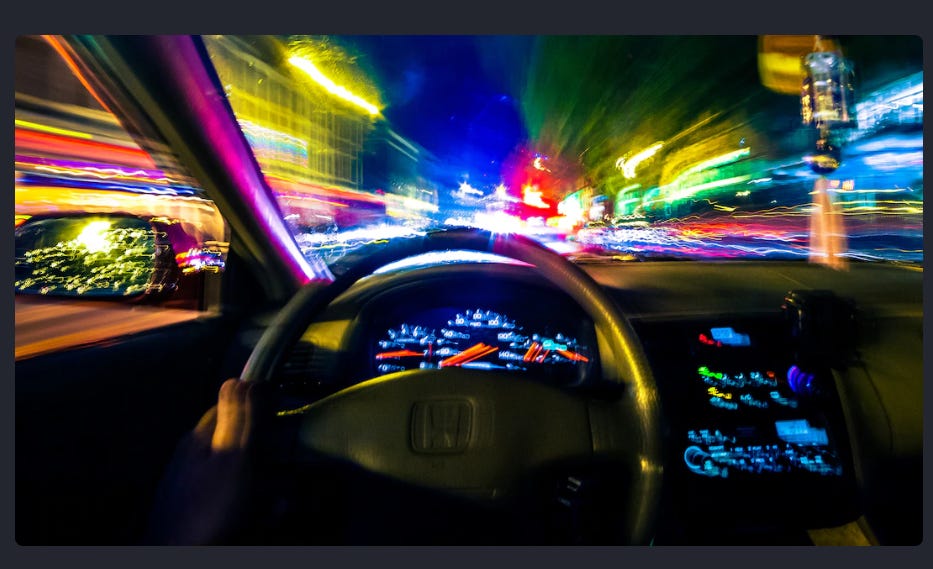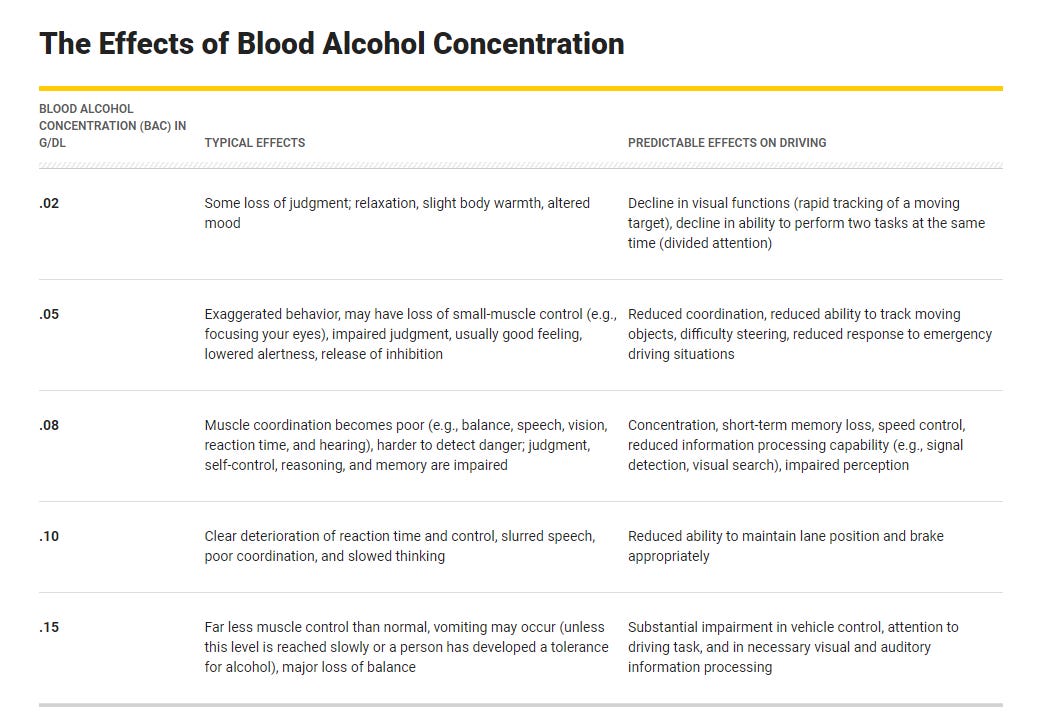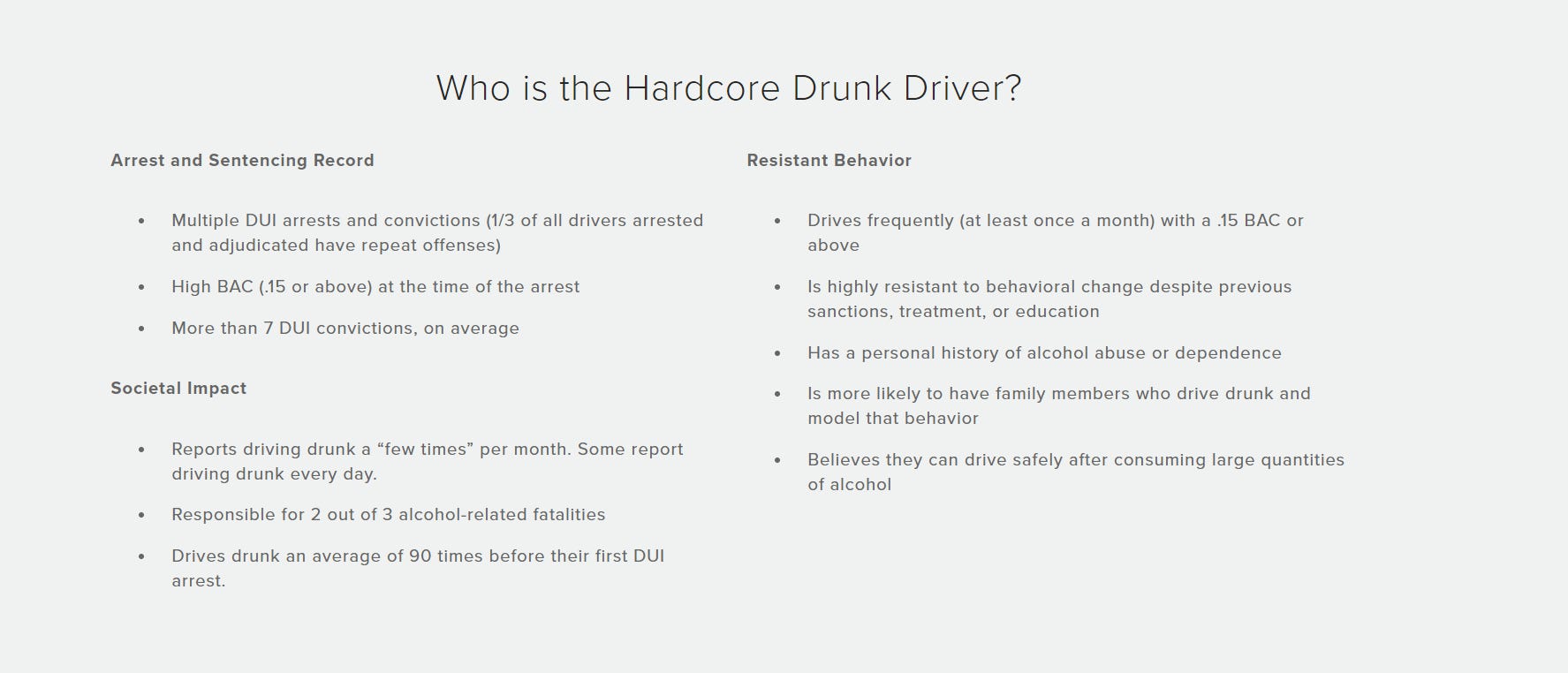Every time I hear of a drunk-driving crash, I’m viscerally affected. Thankfully, fatalities from car-crashes have fallen since 1982, when alcohol-related record-keeping started. But America still has a drinking-and-driving problem. Not as much as South Africa and Canada, but we live and die on booze-fueled and blood-soaked killing roads. They’re not accidents, and everybody is negatively impacted.
Consider some stats:
Driving After Drinking
Driving after drinking is deadly. Yet it still continues to happen across the United States. If you drive while impaired, you could get arrested, or worse — be involved in a traffic crash that causes serious injury or death.
About 32% of all traffic crash fatalities in the United States involve drunk drivers (with BACs of .08 g/dL or higher). In 2022, there were 13,524 people killed in these preventable crashes. In fact, on average over the 10-year period from 2013-2022, about 11,000 people died every year in drunk-driving crashes.
In every state, it’s illegal to drive drunk, yet one person was killed in a drunk-driving crash every 39 minutes in the United States in 2022.
I crashed my Dodge Ram into a King Taco van carrying nine precious souls to work their next event. They never made to the party. I got arrested for that. I didn’t mean to, as the worthless expression goes. My BAC was .14. God saved them from me, and me from myself. I think of that daily.
But I did it. I was warned not to do it. Or to do it again. And now, after serving a prison sentence for Felony DUI, every DUI wreck causes a reaction in me. Elicits a prayer. Creates rage. Invites self-loathing. Inspires action. And motivates hope.
Don’t get me wrong - I was a one-eyed-driver before the legal drinking age in 1982 New Mexico. Compliments of a Beer-Between-the-Legs Double-Clutching-Down-Wolf-Creek-Pass Raging-Alcoholic-Father. Everyone I knew and their dads drove drunk.
What happens when you drive drunk? All hell breaks loose. And good innocent people get killed. And it’s 100% totally preventable. Societally, we allow it.
Being Drunk and High is an Excuse. It’s an Intentional Act. Legally, this is an acceptable defense in the case of Involuntary Intoxication - say you get slipped a Mickey and then cause a Bar Fight - you could argue this and it’s a roll of the dice.
But Voluntary Intoxication? WTF? Being a dumbass is a crime. Especially when it endangers others. How can it br prevented? Well, we could mandate an alcohol-ignition-lock device for all new cars sold in the USA.
Of course there are privacy and other concerns. But I know this: Had there been an ignition lock in my truck that day, it would not have started and caused me to consider what state I was in.
Why would legislators be opposed to a bill that could help prevent drunk driving?
Any regulation is the product of competing viewpoints and interests and are subject to scrutiny. One concern, as noted by Market Watch, is privacy, as “any system of technology that is basically driving surveillance” should not “go beyond what it needs to be.” Electronic Frontier Foundation’s Lee Tien. The concern is that corporations may not protect user privacy–for example, it is one thing that the car cannot be operated if alcohol is detected, but it is another for that information to be released.
Another concern is false negatives and false positive readings. Anyone who has had to use an interlock device or submit to breath testing knows that these machines are not always reliable. Indeed, the American Highway Users Alliance sent a letter to lawmakers in 2020 emphasizing that it’s “extremely important that a technology designed to control human behavior not be imposed before it is clear that civil liberties are protected.”
Here’s a recent post on Substack with a good take on lowering the legal BAC limit to prevent almost 2000 drunk-driving spectator deaths a year. That’s a good trade-off, one would think.
Lowering the BAC limit would not affect a sub-group of drunk-drivers: The Hardcore Drunk Driver. These drivers roll out of the rack at a .12 to .15 BAC and are involved in 58% of all drunk-driving deaths. Like repeat hardcore criminals, these people need to be locked up for a long, long, time.
I Drove Drunk And It Cost 6 People Their Lives. Here's How My Own Life Changed Forever.
I know what living with myself is like after ALMOST killing nine people. Even with that, I cannot imagine living after killing even one person while drunk-driving.
Redemption is available for everyone, myself included. But my prayers and considerations always go to the innocent riders in that van, and to all of the victims of this horrific crime. It’s not an accident.
Other than that, have a great Labor Day!
Ric
What Really Happens to Your Body a Week After You Stop Drinking
Brittany Burke Robert, Jihan Myers
Sun, September 1, 2024 at 7:00 AM PDT·8 min read











I drove drunk once. I was about 18 and came around a corner too fast, encountering an older man dressed in rags. I was able to come to a stop and the man man misunderstood. zhe climed into the car; I handed the keys to a sober friend and haven[t driven drunik since then. That was about sixty years ago. I haven't touched alcohol for the last five years since I gave up driving because of seizures. I was ,smoking in my car in our driveway/carport. Giving up driving meant giving up the two triggers for smoking, alcohol and coffee. Of the three, the only one I still miss is coffee.
I think AI vehicle piloting tech might help considerably.
As someone with many years of professional driving experience, I'm very skeptical that fully autonomous AI-piloted vehicles will ever meet reliability and safety standards to the point where they can entirely replace human drivers and navigators. Too many unique condition sets--"unknowns"--for non-human cognition to accurately and safely interpret, often regarding situations that human intelligence can hack routinely in order to find workarounds.
However, I think it could be lifesaving for more automobiles to be equipped with AI to assist human drivers, as a co-pilot. One of the functions that would be most worthwhile would be the ability to monitor the driving responses of a human driver to detect signs of exhaustion or impairment, such as lane weaving, clearly slowed reflexes, poor use of the acceleration and brake pedals, etc. AI monitoring might signal an initial warning to the driver, say, and then continue monitoring to find out if their driving returns to a competent standard. But if the human driver continues making errors, the AI program could find the shoulder of the road or another safe place to pull the car over to a stop, and then shut it down for a couple of hours. And if the driver starts up the vehicle after that rest period and they're still unable to drive safely, AI could shut it down again.
It's my impression that the technology to accomplish this level of AI piloting is already available. I'm mystified about what makes fully autonomous AI vehicle piloting such an essential goal. This truly looks like a case where the perfect is the enemy of the good. The hurdles related to many modes of partial AI-assisted vehicle piloting have already been achieved, including those that are in my opinion the most important features- like maintaining safe distances between vehicles all the way around, and proper braking in traffic. Whereas completely replacing human drivers would probably entail an interconnected grid system, a technology that's both potentially dystopian and unacceptably fragile. A single failure at a critical junction would be potentially catastrophic. We're much better off with the flexibility and fast response of decentralized decision-making than centralized interlinked control. This is not Legoland, it is not SimCity, it can't be modeled entirely on a screen as a flawlessly performing closed system.
I'm not making the argument against fully autonomous "driverless vehicles" as Luddite gainsaying in order to preserve human jobs. I'm actually not that worried about the effects of UAVs on employment, because driving is almost always only part of the job duties of "driving jobs." Humans still perform tasks like inventory accountability, safe and efficient cargo loading and unloading, passenger boarding and exit, pedestrian assistance for cab passengers, impromptu changes in navigation, and other tasks that have nothing to do with vehicle piloting much more responsively, safely, efficiently, and reliably than any practical robot technology. No AI assistance is going to load a suitcase into an automobile boot, for example, or keep the interior cleaned up between rides. It isn't going to set up the tracks to unload cargo into a warehouse. Etc., etc.
But I'm confident that an AI program is able to detect unsafe vehicle piloting, and safely take steps required to find a safe place to park it and disable the driving functions in the event that it's required.
I've been pointing this out in story comment discussions for quite a number of years. All I need is one person- or, I don't know, maybe an AI program- to read, pay attention, and take my suggestions seriously.